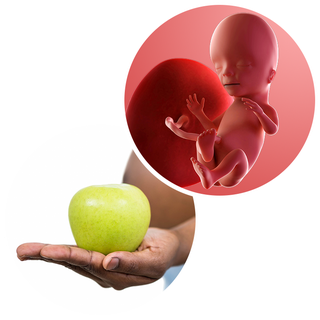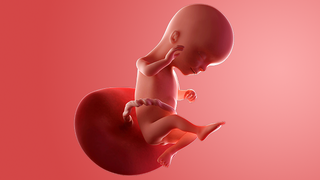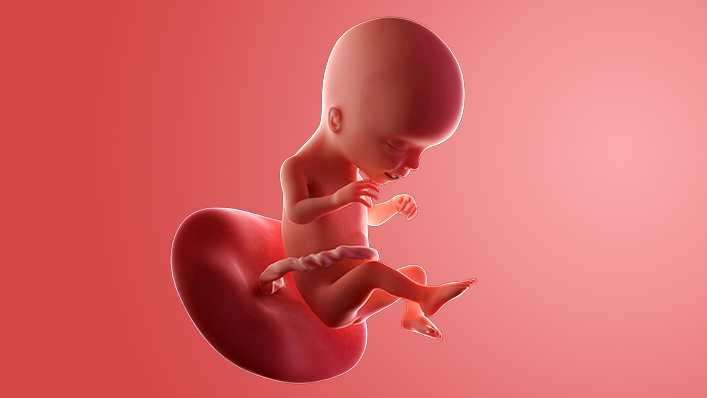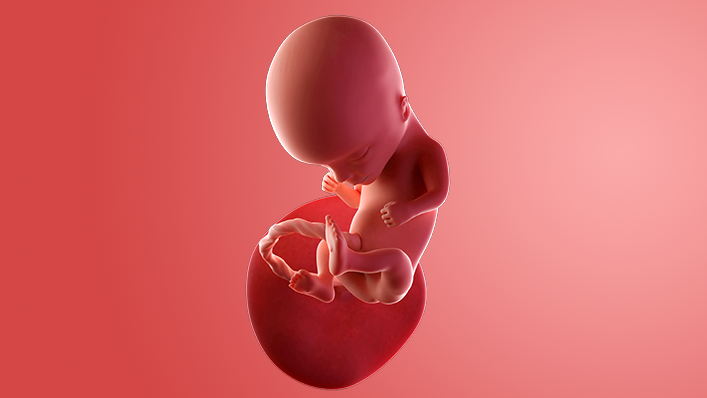- Week 13
- Week 14
- Week 15
- Week 16
- Week 17
- Week 18
- Week 19
- Week 20
- Week 21
- Week 22
- Week 23
- Week 24
- Week 25
- Week 26
- Week 27
Week 15
If you use public transport, you might want to order a "Baby on Board" badge to prompt other commuters into giving up their seat for you.
You might feel fine now, but as you get bigger, you will be more unstable on your feet, and falling over could be stressful and even dangerous.
What's happening in my body?
Your baby is growing quickly and comes with a lot of packaging (the amniotic sac and fluid) and their own food supply (placenta).
You could start getting the odd jabbing pain on the sides of your bump. This is known as "round ligament pain" – putting your feet up and resting can help.
Your skin could also feel a bit itchy. It might help to use an unperfumed moisturiser, wear loose cotton clothing and have a cool bath. If the itching gets worse especially at night, talk to your doctor or midwife.
Changes in your pants
Have you noticed a lot of discharge in your pants? Many women get this.
There's more blood flowing around your pelvic area and that can cause your body to produce more of the milky fluid called leucorrhoea that keeps your vagina clean and free from infection.
See your doctor or midwife if:
- it changes colour – it should be clear, white or creamy
- it smells bad – it should smell slightly musky, not strongly of fish or anything else
- it changes texture – for example, it starts going frothy or looks like cottage cheese
- you get pain when peeing
- you feel itchy or sore
Thrush
If you have a vaginal infection, it's likely to be thrush, which is a common yeast infection.
Signs include a lumpy white discharge, itching around your vagina, and stinging when you pee or have sex.
To help prevent thrush:
- wear loose cotton underwear
- use unperfumed soap or body wash
- steer clear of sex until it's cleared up
There are more tips to beat thrush on the NHS website.
2nd trimester pregnancy symptoms (at 15 weeks)
You may still be experiencing pregnancy symptoms including:
- swollen and bleeding gums (read about gum health in week 13)
- pains on the side of your belly, caused by your expanding womb (known as 'round ligament pains')
- headaches (read about headaches in pregnancy on NHS.uk)
- nosebleeds
- feeling bloated (read how to cope with bloating on week 10's page)
- constipation (read how to deal with constipation on week 16's page)
- indigestion and heartburn (read about how to treat indigestion and heartburn on week 25's page)
- sore breasts
- leg cramps
- feeling hot
- dizziness
- swollen hands and feet
- urine infections
- vaginal infections (read about vaginal infections in week 15
- darkened skin on your face or brown patches – this is known as chloasma or the 'mask of pregnancy'
- greasier, spotty skin
- thicker and shinier hair
You may also experience symptoms from earlier weeks, such as:
- morning sickness (see week 6 for morning sickness advice)
- weird pregnancy cravings
- a heightened sense of smell
- mood swings (read about dealing with mood swings on week 8's page)
- a white milky pregnancy discharge from your vagina and light spotting (seek medical advice for any bleeding)
What does my baby look like?
Your baby, or foetus, is around 10.1cm long from head to bottom, which is about the size of an apple.
Your baby has been busy growing a soft layer of hair, called "lanugo", all over their body. Their eyebrows and eyelashes are also starting to develop. Your baby's eyes are now sensitive to light.
Around now, your baby will start hearing too. Talk to your baby and they will probably hear you. They will also hear your heartbeat and any noises made by your digestive system.

Action stations
More in week-by-week

Week 16
Your baby is growing quickly and about to have another growth spurt. You will probably have put on some weight over the past few weeks too.
More in week-by-week guide to pregnancy


